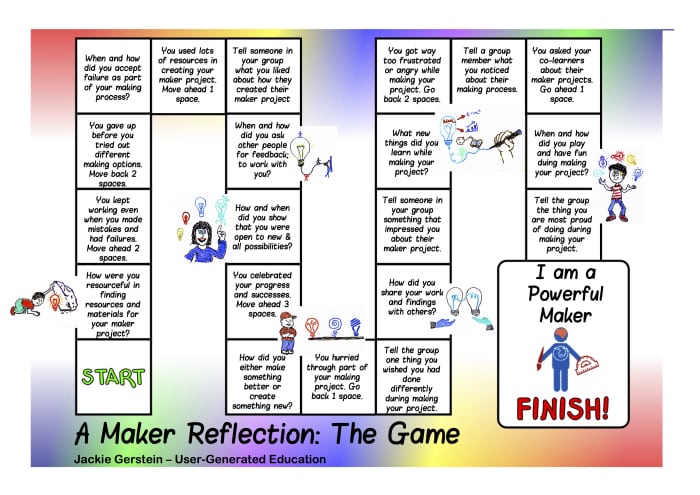
This Game Can Help Students Understand The Maker Learning Process
by Dr. Jackie Gerstein
My background is in experiential education.
One of the strategies used in experiential education is debriefing or reflecting on the experience. In other words, learning from direct experience is not left to chance. The educator becomes proactive in debriefing or processing the experiences to increase the chances that learning occurs. This is in line with John Dewey’s ideas, ‘We do not learn from experience, we learn from reflecting on experience.’
We do not learn from experience, we learn from reflecting on experience.
A recent research study published via Harvard Business Review concluded that:
- Learning from direct experience can be more effective if coupled with reflection–that is, the intentional attempt to synthesize, abstract, and articulate the key lessons taught by experience.
- Reflecting on what has been learned makes experience more productive.
- Reflection builds one’s confidence in the ability to achieve a goal (i.e., self-efficacy), which in turn translates into higher rates of learning (source).
In line with reflecting on experiences, I developed a list of questions and a board game (I love using board games in my classrooms of all ages from elementary to graduate level!) to help with reflecting on the maker process following the completion of maker projects. The purpose of these tools is to increase the possible learning and insights that learners extract from their maker projects.
Reflection is a crucial part of any formal or informal learning experience.
Reflecting can also come in many forms—daydreaming, recalling a past experience alone, having a conversation, journaling, and countless other activities. (Actually, that’s a good idea for a separate post.)
Maker Learning is an approach to learning based on—well, based on making things. Tinkering. Design. Creativity. Collaboration. Iterating. Failing, then trying again.
Combine the two and add a little gamification and you’ve got this game from Jackie Gerstein, Maker advocate, college professor, and TeachThought Professional Development workshop facilitator.
Why Use A Game To Coach Maker Learning?
In addition the reflective questions for maker education, you can also use the same principle as a basic game to help students better understand the ethos and process of maker learning–or rather, what it takes to truly succeed in the maker approach to education.
If they can better understand the fundamental ‘tinker spirit,’ the other elements of maker learning–from design and collaboration to communication and craftsmanship–all are more accessible to the student. Put another way, if they can’t make it past the ‘try-fail-try again’ pattern–if they can’t truly buy-in to this model for learning–the rest of the bits and pieces don’t really matter.
You can see more maker education resources and follow our Maker Board on pinterest here.
A Game To Help Students Understand The Maker Learning Process
